
Common name:California Sycamore
Botanical name:Platanus racemosa
The California Sycamore is a fast growing deciduous tree that reaches up to 40'-50' high. It tolerates heat, smog, and drought conditions as well as moist conditions; it is native to riparian areas. It has interesting mottled bark when the tree is bare in winter.
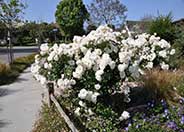
Common name:Iceberg Floribunda Rose
Botanical name:Rosa 'Iceberg'
This is a shrub rose (there are climbing varieties) with an abundance of fragrant, medium sized, white blooms. It is one of the most popular roses and very tough.
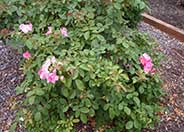
Common name:Shrub Rose
Botanical name:Rosa Shrub varieties
The dark green, heavily veined leaves of this bushy shrub are strong support for the pure white or pink, nearly double flowers it produces. This is a very tolerant, heavily scented plant with an impressive fall color. Also, large hips appear intermittently with this plant.
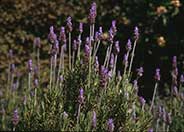
Common name:French Lavender, Toothed Lavender
Botanical name:Lavandula dentata
This lavender has green leaves and will grow 3' tall and 5' wide. It has lavender flowers that are prominent in the spring and summer months.
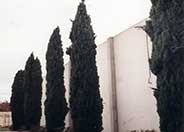
Common name:Italian Cypress
Botanical name:Cupressus sempervirens 'Stricta'
Italian Cypress is often associated with Italian and Spanish architecture, providing columns in the landscape. They often reach 60' tall. 'Stricta' is compact, columnar and produces long, straight branches with deep green foliage.
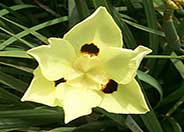
Common name:Yellow Moraea, Fortnight Lily
Botanical name:Dietes bicolor
This clumping perennial Iris relative stands 3'-4' high. It has light yellow, iris-like flowers with maroon blotches that are about 2" wide. It performs best in full sun and in soil with good drainage.
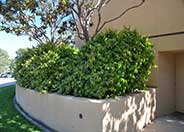
Common name:Xylosma
Botanical name:Xylosma congestum
This medium sized, mounding evergreen shrub with lustrous yellow green foliage produces new growth that is tinted rosy red. It has a growth habit that is loose, graceful and spreading.
Designer: Barbara Lentz
Photographer: GardenSoft
Incorporate compost 6" into your soil to retain water, reduce compaction, feed earthworms, and provide valuable nutrients to your plants.
Adjust sprinklers to avoid watering sidewalks and driveways.
Attract, or buy beneficial insects such as ladybugs and lacewings to control pest outbreaks in your garden.